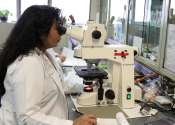Scientists reveal molecular structure of bacterial gas vesicles
Similar in function to ballast tanks in submarines or fish bladders, many water-based bacteria use gas vesicles to regulate their floatability. In a new publication in Cell, scientists from the Departments of Bionanoscience ...









